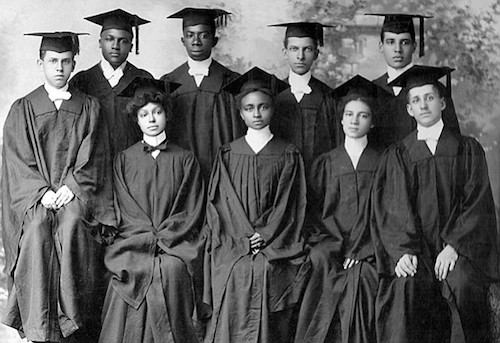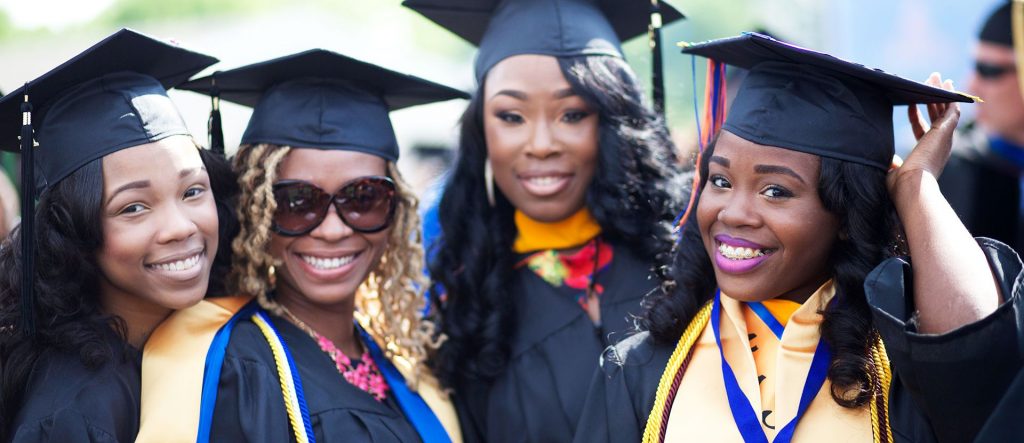Communiqué
“Tell Them We Are Rising: The Story of Black Colleges and Universities” on INDEPENDENT LENS, Thursday, February 27 at 9
< < Back toStanley Nelson’s Tell Them We Are Rising: The Story of Black Colleges and Universities on Independent Lens
Thursday, February 27, 2020 on WOUB
The rich history of America’s Historically Black Colleges and Universities (HBCUs) began before the end of slavery, flourished in the 20th century, and profoundly influenced the course of the nation for over 150 years — yet remains largely unknown. With Tell Them We Are Rising: The Story of Black Colleges and Universities, the latest documentary from Stanley Nelson (Black Panthers, Freedom Riders), America’s foremost film chronicler of the African American experience, the powerful story of the rise, influence, and evolution of HBCUs comes to life. Tell Them We Are Rising, co-directed and co-produced by Marco Williams, airs on Independent Lens, Thursday, February 27, 2020, 9:00-10:30 PM on WOUB.

Credit: Atlanta University Center
A haven for Black intellectuals, artists, and revolutionaries — and a path of promise toward the American dream — HBCUs have educated the architects of freedom movements and cultivated leaders in every field while remaining unapologetically Black for more than 150 years. These institutions have nurtured some of the most influential Americans of our time, from Booker T. Washington to Martin Luther King, Jr., W.E.B. Du Bois to Ralph Ellison, Toni Morrison to Oprah Winfrey, Alice Walker to Spike Lee to Common.
A key driver of Black social, political and economic progress, HBCUs were also a place of unprecedented freedom for African American students and a refuge from the rampant racism that raged outside the campus walls. Created following the era when it was a crime in many states to teach African Americans to read, HBCUs sprang up following the end of the Civil War, particularly in the rural South. On these campuses were waged the intellectual battles that would determine the future of African American society, starting with the ideological difference between Booker T. Washington’s emphasis on technical trades and W.E.B. Du Bois’s more progressive vision of HBCUs as not just institutions for turning out labor for white businesses but places of intellectual rigor and societal transformation.
That ideology took root following WWI, when African American soldiers returned from the front expecting a more equitable piece of the American dream. Known as “The New Negro” movement, these new students wanted nothing less than the full rights of citizenship. More HBCUs were founded – and run by African American leaders unlike their predecessors. During the 1930s and 40s — what many consider the “Golden Age” of HBCUs — these institutions graduated doctors, lawyers, and professionals who created the first Black middle class.
 The influence of HBCUs would continue to grow as Howard University Law School Dean Charles Hamilton Houston and graduate Thurgood Marshall fought the case that sounded the death knell for segregation with Brown v. Board of Education in 1954; six years later, it was four North Carolina A&T students who began the Greensboro lunch counter sit-in that led to the dismantling of segregation in public spaces.
The influence of HBCUs would continue to grow as Howard University Law School Dean Charles Hamilton Houston and graduate Thurgood Marshall fought the case that sounded the death knell for segregation with Brown v. Board of Education in 1954; six years later, it was four North Carolina A&T students who began the Greensboro lunch counter sit-in that led to the dismantling of segregation in public spaces.
Says filmmaker Stanley Nelson: “My parents were the product of HBCUs. For generations, there was no other place our parents, grandparents, and great-grandparents could go to school. I set out to tell a story of Americans who refused to be denied a higher education and — in their resistance — created a set of institutions that would influence and shape the landscape of the country for centuries to come. If education is a cornerstone of society, then HBCUs are the groundwork for advancing justice in America.”
“I first began working with Stanley Nelson in 2003 when we presented his family memoir A Place of Our Own,” said Lois Vossen, Independent Lens executive producer. “One of our preeminent storytellers, when he proposed his ‘America Revisited’ trilogy — which includes Black Panthers, Tell Them We Are Rising, and a third film about the slave trade currently in production — we didn’t fully realize how relevant these films would be. The history we make each day reminds us that an educated Black population cannot be an enslaved population, as education advances justice in America.”
Visit the Tell Them We Are Rising page on Independent Lens, which features more information about the film.

